
New 2024 Approved MP3 Optimization 101 Top Editing Practices for Sound Quality

MP3 Optimization 101: Top Editing Practices for Sound Quality
Music lovers usually have a collection of MP3 songs. Some like to collect songs, and some like to listen to new songs, whereas some people are very much interested in simply editing MP3 songs. For doing this, a good MP3 editor is essential.
How to find a good audio MP3 editor? The article understudy will introduce an amazing audio editor along with its steps so that you get to know how to edit MP3 files. If you are ready to learn more about MP3 editing, then let’s get started without any further delay.
In this article
02 3 Popular Free MP3 Editor for Windows
Part 1 How to Edit MP3 Files?
As we have mentioned earlier, to edit MP3 files, a good audio editor is essential. Do you know any good Audio Editor? Although there are various editors, Wondershare Filmora is unbeatable. It offers a whole editing world to its users. Filmora is hands down the best software when it comes to audio editing. Its intuitive interface is easy to understand and work with that even beginners can use it.
What else does Filmora have to offer? It provides various editing elements. You name anything, and Filmora has it. The editor has a wide variety of Transitions, Effects, Filters, and other elements. Interestingly, Filmora also has a media library, Filmstock, that is full of amazing things.
Features of Filmora That Will Amaze You
As we are talking about MP3 editing so, let’s shed light on Filmora Audio Editor. The editor has some mind-blowing features that you should know.
- Audio Split is a key feature that good Audio Editors must have. Filmora lets you split audio, and additionally, you can also Trim Audio with this editor.
- A very highlighting feature that you get from Filmora Audio Editor is ‘Detach Audio from Video.’ With this feature, you can detach and remove audio from video.
- Features like Audio Denoise, Audio Mixer, Audio Equalizer are also offered by Wondershare Filmora Audio Editor.
- Ready to know a fun feature? Not only can you add Voiceover, Filmora easily replaces the original audio of the video.
For Win 7 or later (64-bit)
For macOS 10.12 or later
Step-by-Step Guideline to use Filmora Audio Editor
Are you ready to use Filmora Audio Editor, but do you know how to edit an MP3 file? Don’t worry if you have never done this before because we are about to share its step-by-step guideline.
Step 1: Importing Audio
To edit the MP3 file with Filmora Audio Editor, you firstly need to create a new project. After the project has been created, let’s import the media file. For that, go to ‘Import Media’ from the Files tab and select ‘Import Media Files.’
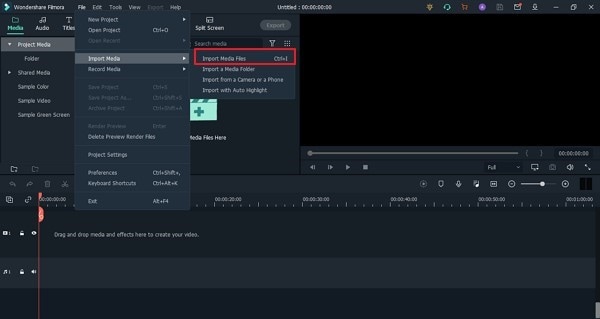
Step 2: Audio Editing Panel
Once the file has been imported, drag it onto the timeline so that you can start editing the audio. You have to double click on the audio file to open the ‘Audio Editing Panel.’
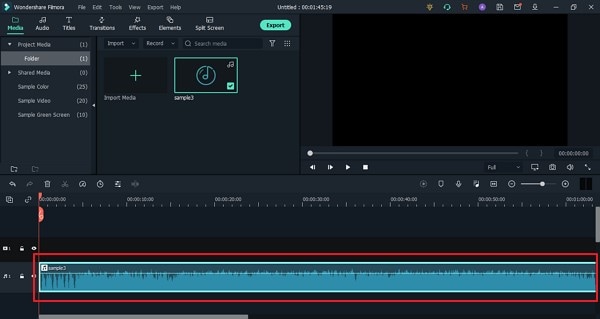
Step 3: Let’s Start Editing
With the Audio Editing Panel, you can completely edit and customize the MP3 file. It offers the ‘Fade In’ and ‘Fade Out’ options. You can also remove background noise from the ‘Denoise’ option. Moreover, you can use the Equalizer, set the Pitch, etc.
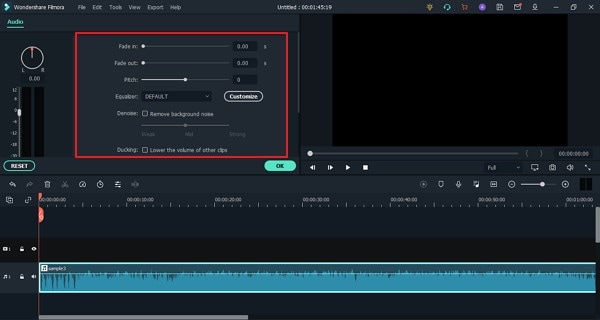
Step 4: Export the File
Lastly, once the editing is complete and you are satisfied, you can export the file. For that, hit the ‘Export’ button to open the export window. There, head over to the ‘Local’ section to select ‘MP3’ as the output format and ‘Export’ it to your device.
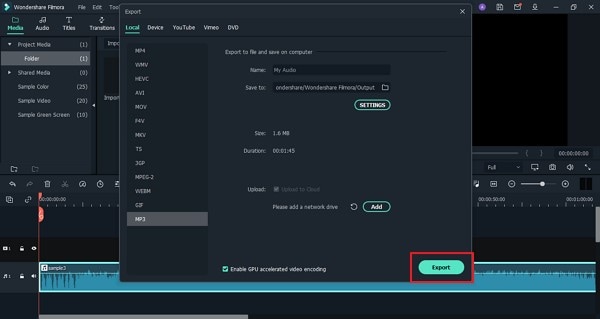
Part 2 3 Popular Free MP3 Editor for Windows
Now that we have discussed in detail Wondershare Filmora, should we talk a little about free MP3 editors? You can get a variety of free MP3 editors for Windows on the internet, but how do you know that yours is the best? If you want to know about the 3 best MP3 editors that are famous for their features, then this section is for you.
01 Audacity
Audacity is a fantastic audio editing software that is perfect for music trimming, sound effects, and dialogue. The tool offers a free version to its users. Audacity is open-source, a multi-track audio editor that makes editing easy.
The plus point for this editing software is that it supports a wide range of file formats like FLAC, WAV, MP3, and others. What attracts the users? Well, the easy and simple interface of Audacity attracts a lot of users. Another thing that matters a lot is the installation process, and in Audacity’s case, the installation is pretty easy.
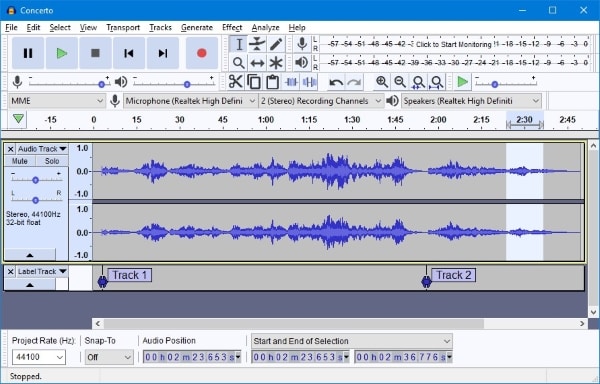
- For endless audio editing and merging audio files, nothing is better than Audacity. Also, the software supports 16-bit, 24-bit, and 32-bit sound quality.
- Audacity provides support to various plug-ins, for instance, LV2, Nyquist, VST, LADSPA, and also Audio Unit Effect.
- Another interesting thing about Audacity is that it records live audio from Mic or Mixer. You can also combine files and export them in different formats.
02 Ocenaudio
Can you name a great audio editor for home musicians and podcasters? Yes, Ocenaudio Audio Editor is the perfect, free audio editing platform for podcasters and home musicians. The audio editor has a very clear interface that everyone can use easily, without any complications. Editing MP3 files and analyzing them is made easy with Ocenaudio.
The audio editing software is famous because of its efficiency as it can edit large files. Do you want to know the fascinating thing about Ocenaudio? Well, the software uses advanced memory management, which means it opens files without wasting your PC’s memory.
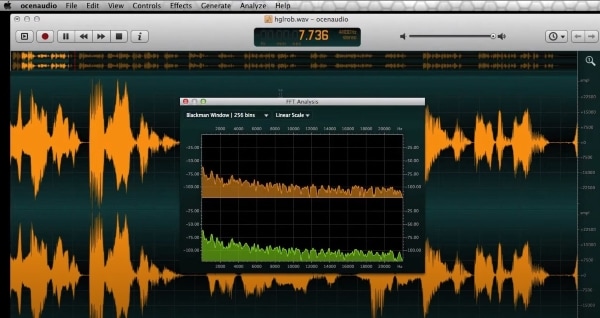
- The audio editor is the best option for everyday audio editing. Also, the software offers great filter selection with precise selection tools.
- What attracts the most users is its powerful and complete spectrogram view. Along with the waveform view, Ocenaudio also features a spectrogram view of the audio files.
- The software offers uniform features and the same graphics on all versions. Moreover, it supports various platforms like Windows, Mac OS X, and Linux.
03 WavePad Audio Editor
Are you ready to talk about WavePad Audio Editor? The software is very famous because of the wide range of features it offers. What can you do with this audio editor? Let’s start sharing!
With WavePad Audio Editor, you can edit audio by trimming, cutting, joining, splitting, etc. In addition to editing, you can also add different effects to your audio. For instance, effects like to normalize, amplify, equalize, etc. The audio editor also supports extracting audio from CDs and removing audio noise.
Do you know what else it can do? You can easily edit and export the audio file in different formats from WavePad Audio Editor.
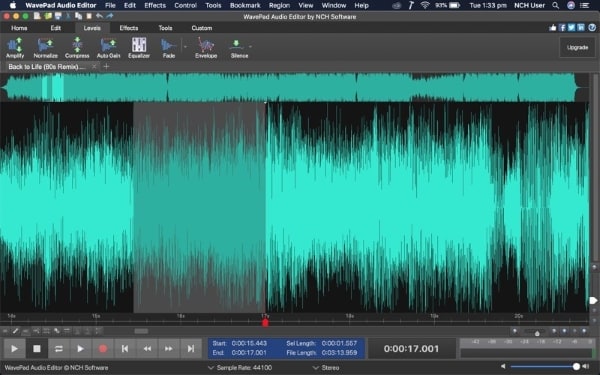
- The most amazing thing about WavePad Audio Editor is that it supports batch processing. You no longer have to wait as the software works very efficiently.
- Want to know something interesting about WavePad Audio Editor? It is compatible with different file formats and holds strong editing capabilities.
- Which audio editor can compress files? With WavePad, you can compress files with great ease and load files with just two mouse clicks.
Bottom Line
As we promised earlier that we would help you and guide you on how to edit MP3 files so, this article has everything you need. We shared how you can edit MP3 files with the best audio MP3 editor, Wondershare Filmora. Along with that, we also shared 3 popular and free audio MP3 editors.
Wondershare Filmora
Get started easily with Filmora’s powerful performance, intuitive interface, and countless effects!
Try It Free Try It Free Try It Free Learn More >

02 3 Popular Free MP3 Editor for Windows
Part 1 How to Edit MP3 Files?
As we have mentioned earlier, to edit MP3 files, a good audio editor is essential. Do you know any good Audio Editor? Although there are various editors, Wondershare Filmora is unbeatable. It offers a whole editing world to its users. Filmora is hands down the best software when it comes to audio editing. Its intuitive interface is easy to understand and work with that even beginners can use it.
What else does Filmora have to offer? It provides various editing elements. You name anything, and Filmora has it. The editor has a wide variety of Transitions, Effects, Filters, and other elements. Interestingly, Filmora also has a media library, Filmstock, that is full of amazing things.
Features of Filmora That Will Amaze You
As we are talking about MP3 editing so, let’s shed light on Filmora Audio Editor. The editor has some mind-blowing features that you should know.
- Audio Split is a key feature that good Audio Editors must have. Filmora lets you split audio, and additionally, you can also Trim Audio with this editor.
- A very highlighting feature that you get from Filmora Audio Editor is ‘Detach Audio from Video.’ With this feature, you can detach and remove audio from video.
- Features like Audio Denoise, Audio Mixer, Audio Equalizer are also offered by Wondershare Filmora Audio Editor.
- Ready to know a fun feature? Not only can you add Voiceover, Filmora easily replaces the original audio of the video.
For Win 7 or later (64-bit)
For macOS 10.12 or later
Step-by-Step Guideline to use Filmora Audio Editor
Are you ready to use Filmora Audio Editor, but do you know how to edit an MP3 file? Don’t worry if you have never done this before because we are about to share its step-by-step guideline.
Step 1: Importing Audio
To edit the MP3 file with Filmora Audio Editor, you firstly need to create a new project. After the project has been created, let’s import the media file. For that, go to ‘Import Media’ from the Files tab and select ‘Import Media Files.’

Step 2: Audio Editing Panel
Once the file has been imported, drag it onto the timeline so that you can start editing the audio. You have to double click on the audio file to open the ‘Audio Editing Panel.’

Step 3: Let’s Start Editing
With the Audio Editing Panel, you can completely edit and customize the MP3 file. It offers the ‘Fade In’ and ‘Fade Out’ options. You can also remove background noise from the ‘Denoise’ option. Moreover, you can use the Equalizer, set the Pitch, etc.

Step 4: Export the File
Lastly, once the editing is complete and you are satisfied, you can export the file. For that, hit the ‘Export’ button to open the export window. There, head over to the ‘Local’ section to select ‘MP3’ as the output format and ‘Export’ it to your device.

Part 2 3 Popular Free MP3 Editor for Windows
Now that we have discussed in detail Wondershare Filmora, should we talk a little about free MP3 editors? You can get a variety of free MP3 editors for Windows on the internet, but how do you know that yours is the best? If you want to know about the 3 best MP3 editors that are famous for their features, then this section is for you.
01 Audacity
Audacity is a fantastic audio editing software that is perfect for music trimming, sound effects, and dialogue. The tool offers a free version to its users. Audacity is open-source, a multi-track audio editor that makes editing easy.
The plus point for this editing software is that it supports a wide range of file formats like FLAC, WAV, MP3, and others. What attracts the users? Well, the easy and simple interface of Audacity attracts a lot of users. Another thing that matters a lot is the installation process, and in Audacity’s case, the installation is pretty easy.

- For endless audio editing and merging audio files, nothing is better than Audacity. Also, the software supports 16-bit, 24-bit, and 32-bit sound quality.
- Audacity provides support to various plug-ins, for instance, LV2, Nyquist, VST, LADSPA, and also Audio Unit Effect.
- Another interesting thing about Audacity is that it records live audio from Mic or Mixer. You can also combine files and export them in different formats.
02 Ocenaudio
Can you name a great audio editor for home musicians and podcasters? Yes, Ocenaudio Audio Editor is the perfect, free audio editing platform for podcasters and home musicians. The audio editor has a very clear interface that everyone can use easily, without any complications. Editing MP3 files and analyzing them is made easy with Ocenaudio.
The audio editing software is famous because of its efficiency as it can edit large files. Do you want to know the fascinating thing about Ocenaudio? Well, the software uses advanced memory management, which means it opens files without wasting your PC’s memory.

- The audio editor is the best option for everyday audio editing. Also, the software offers great filter selection with precise selection tools.
- What attracts the most users is its powerful and complete spectrogram view. Along with the waveform view, Ocenaudio also features a spectrogram view of the audio files.
- The software offers uniform features and the same graphics on all versions. Moreover, it supports various platforms like Windows, Mac OS X, and Linux.
03 WavePad Audio Editor
Are you ready to talk about WavePad Audio Editor? The software is very famous because of the wide range of features it offers. What can you do with this audio editor? Let’s start sharing!
With WavePad Audio Editor, you can edit audio by trimming, cutting, joining, splitting, etc. In addition to editing, you can also add different effects to your audio. For instance, effects like to normalize, amplify, equalize, etc. The audio editor also supports extracting audio from CDs and removing audio noise.
Do you know what else it can do? You can easily edit and export the audio file in different formats from WavePad Audio Editor.

- The most amazing thing about WavePad Audio Editor is that it supports batch processing. You no longer have to wait as the software works very efficiently.
- Want to know something interesting about WavePad Audio Editor? It is compatible with different file formats and holds strong editing capabilities.
- Which audio editor can compress files? With WavePad, you can compress files with great ease and load files with just two mouse clicks.
Bottom Line
As we promised earlier that we would help you and guide you on how to edit MP3 files so, this article has everything you need. We shared how you can edit MP3 files with the best audio MP3 editor, Wondershare Filmora. Along with that, we also shared 3 popular and free audio MP3 editors.
Wondershare Filmora
Get started easily with Filmora’s powerful performance, intuitive interface, and countless effects!
Try It Free Try It Free Try It Free Learn More >

02 3 Popular Free MP3 Editor for Windows
Part 1 How to Edit MP3 Files?
As we have mentioned earlier, to edit MP3 files, a good audio editor is essential. Do you know any good Audio Editor? Although there are various editors, Wondershare Filmora is unbeatable. It offers a whole editing world to its users. Filmora is hands down the best software when it comes to audio editing. Its intuitive interface is easy to understand and work with that even beginners can use it.
What else does Filmora have to offer? It provides various editing elements. You name anything, and Filmora has it. The editor has a wide variety of Transitions, Effects, Filters, and other elements. Interestingly, Filmora also has a media library, Filmstock, that is full of amazing things.
Features of Filmora That Will Amaze You
As we are talking about MP3 editing so, let’s shed light on Filmora Audio Editor. The editor has some mind-blowing features that you should know.
- Audio Split is a key feature that good Audio Editors must have. Filmora lets you split audio, and additionally, you can also Trim Audio with this editor.
- A very highlighting feature that you get from Filmora Audio Editor is ‘Detach Audio from Video.’ With this feature, you can detach and remove audio from video.
- Features like Audio Denoise, Audio Mixer, Audio Equalizer are also offered by Wondershare Filmora Audio Editor.
- Ready to know a fun feature? Not only can you add Voiceover, Filmora easily replaces the original audio of the video.
For Win 7 or later (64-bit)
For macOS 10.12 or later
Step-by-Step Guideline to use Filmora Audio Editor
Are you ready to use Filmora Audio Editor, but do you know how to edit an MP3 file? Don’t worry if you have never done this before because we are about to share its step-by-step guideline.
Step 1: Importing Audio
To edit the MP3 file with Filmora Audio Editor, you firstly need to create a new project. After the project has been created, let’s import the media file. For that, go to ‘Import Media’ from the Files tab and select ‘Import Media Files.’

Step 2: Audio Editing Panel
Once the file has been imported, drag it onto the timeline so that you can start editing the audio. You have to double click on the audio file to open the ‘Audio Editing Panel.’

Step 3: Let’s Start Editing
With the Audio Editing Panel, you can completely edit and customize the MP3 file. It offers the ‘Fade In’ and ‘Fade Out’ options. You can also remove background noise from the ‘Denoise’ option. Moreover, you can use the Equalizer, set the Pitch, etc.

Step 4: Export the File
Lastly, once the editing is complete and you are satisfied, you can export the file. For that, hit the ‘Export’ button to open the export window. There, head over to the ‘Local’ section to select ‘MP3’ as the output format and ‘Export’ it to your device.

Part 2 3 Popular Free MP3 Editor for Windows
Now that we have discussed in detail Wondershare Filmora, should we talk a little about free MP3 editors? You can get a variety of free MP3 editors for Windows on the internet, but how do you know that yours is the best? If you want to know about the 3 best MP3 editors that are famous for their features, then this section is for you.
01 Audacity
Audacity is a fantastic audio editing software that is perfect for music trimming, sound effects, and dialogue. The tool offers a free version to its users. Audacity is open-source, a multi-track audio editor that makes editing easy.
The plus point for this editing software is that it supports a wide range of file formats like FLAC, WAV, MP3, and others. What attracts the users? Well, the easy and simple interface of Audacity attracts a lot of users. Another thing that matters a lot is the installation process, and in Audacity’s case, the installation is pretty easy.

- For endless audio editing and merging audio files, nothing is better than Audacity. Also, the software supports 16-bit, 24-bit, and 32-bit sound quality.
- Audacity provides support to various plug-ins, for instance, LV2, Nyquist, VST, LADSPA, and also Audio Unit Effect.
- Another interesting thing about Audacity is that it records live audio from Mic or Mixer. You can also combine files and export them in different formats.
02 Ocenaudio
Can you name a great audio editor for home musicians and podcasters? Yes, Ocenaudio Audio Editor is the perfect, free audio editing platform for podcasters and home musicians. The audio editor has a very clear interface that everyone can use easily, without any complications. Editing MP3 files and analyzing them is made easy with Ocenaudio.
The audio editing software is famous because of its efficiency as it can edit large files. Do you want to know the fascinating thing about Ocenaudio? Well, the software uses advanced memory management, which means it opens files without wasting your PC’s memory.

- The audio editor is the best option for everyday audio editing. Also, the software offers great filter selection with precise selection tools.
- What attracts the most users is its powerful and complete spectrogram view. Along with the waveform view, Ocenaudio also features a spectrogram view of the audio files.
- The software offers uniform features and the same graphics on all versions. Moreover, it supports various platforms like Windows, Mac OS X, and Linux.
03 WavePad Audio Editor
Are you ready to talk about WavePad Audio Editor? The software is very famous because of the wide range of features it offers. What can you do with this audio editor? Let’s start sharing!
With WavePad Audio Editor, you can edit audio by trimming, cutting, joining, splitting, etc. In addition to editing, you can also add different effects to your audio. For instance, effects like to normalize, amplify, equalize, etc. The audio editor also supports extracting audio from CDs and removing audio noise.
Do you know what else it can do? You can easily edit and export the audio file in different formats from WavePad Audio Editor.

- The most amazing thing about WavePad Audio Editor is that it supports batch processing. You no longer have to wait as the software works very efficiently.
- Want to know something interesting about WavePad Audio Editor? It is compatible with different file formats and holds strong editing capabilities.
- Which audio editor can compress files? With WavePad, you can compress files with great ease and load files with just two mouse clicks.
Bottom Line
As we promised earlier that we would help you and guide you on how to edit MP3 files so, this article has everything you need. We shared how you can edit MP3 files with the best audio MP3 editor, Wondershare Filmora. Along with that, we also shared 3 popular and free audio MP3 editors.
Wondershare Filmora
Get started easily with Filmora’s powerful performance, intuitive interface, and countless effects!
Try It Free Try It Free Try It Free Learn More >

02 3 Popular Free MP3 Editor for Windows
Part 1 How to Edit MP3 Files?
As we have mentioned earlier, to edit MP3 files, a good audio editor is essential. Do you know any good Audio Editor? Although there are various editors, Wondershare Filmora is unbeatable. It offers a whole editing world to its users. Filmora is hands down the best software when it comes to audio editing. Its intuitive interface is easy to understand and work with that even beginners can use it.
What else does Filmora have to offer? It provides various editing elements. You name anything, and Filmora has it. The editor has a wide variety of Transitions, Effects, Filters, and other elements. Interestingly, Filmora also has a media library, Filmstock, that is full of amazing things.
Features of Filmora That Will Amaze You
As we are talking about MP3 editing so, let’s shed light on Filmora Audio Editor. The editor has some mind-blowing features that you should know.
- Audio Split is a key feature that good Audio Editors must have. Filmora lets you split audio, and additionally, you can also Trim Audio with this editor.
- A very highlighting feature that you get from Filmora Audio Editor is ‘Detach Audio from Video.’ With this feature, you can detach and remove audio from video.
- Features like Audio Denoise, Audio Mixer, Audio Equalizer are also offered by Wondershare Filmora Audio Editor.
- Ready to know a fun feature? Not only can you add Voiceover, Filmora easily replaces the original audio of the video.
For Win 7 or later (64-bit)
For macOS 10.12 or later
Step-by-Step Guideline to use Filmora Audio Editor
Are you ready to use Filmora Audio Editor, but do you know how to edit an MP3 file? Don’t worry if you have never done this before because we are about to share its step-by-step guideline.
Step 1: Importing Audio
To edit the MP3 file with Filmora Audio Editor, you firstly need to create a new project. After the project has been created, let’s import the media file. For that, go to ‘Import Media’ from the Files tab and select ‘Import Media Files.’

Step 2: Audio Editing Panel
Once the file has been imported, drag it onto the timeline so that you can start editing the audio. You have to double click on the audio file to open the ‘Audio Editing Panel.’

Step 3: Let’s Start Editing
With the Audio Editing Panel, you can completely edit and customize the MP3 file. It offers the ‘Fade In’ and ‘Fade Out’ options. You can also remove background noise from the ‘Denoise’ option. Moreover, you can use the Equalizer, set the Pitch, etc.

Step 4: Export the File
Lastly, once the editing is complete and you are satisfied, you can export the file. For that, hit the ‘Export’ button to open the export window. There, head over to the ‘Local’ section to select ‘MP3’ as the output format and ‘Export’ it to your device.

Part 2 3 Popular Free MP3 Editor for Windows
Now that we have discussed in detail Wondershare Filmora, should we talk a little about free MP3 editors? You can get a variety of free MP3 editors for Windows on the internet, but how do you know that yours is the best? If you want to know about the 3 best MP3 editors that are famous for their features, then this section is for you.
01 Audacity
Audacity is a fantastic audio editing software that is perfect for music trimming, sound effects, and dialogue. The tool offers a free version to its users. Audacity is open-source, a multi-track audio editor that makes editing easy.
The plus point for this editing software is that it supports a wide range of file formats like FLAC, WAV, MP3, and others. What attracts the users? Well, the easy and simple interface of Audacity attracts a lot of users. Another thing that matters a lot is the installation process, and in Audacity’s case, the installation is pretty easy.

- For endless audio editing and merging audio files, nothing is better than Audacity. Also, the software supports 16-bit, 24-bit, and 32-bit sound quality.
- Audacity provides support to various plug-ins, for instance, LV2, Nyquist, VST, LADSPA, and also Audio Unit Effect.
- Another interesting thing about Audacity is that it records live audio from Mic or Mixer. You can also combine files and export them in different formats.
02 Ocenaudio
Can you name a great audio editor for home musicians and podcasters? Yes, Ocenaudio Audio Editor is the perfect, free audio editing platform for podcasters and home musicians. The audio editor has a very clear interface that everyone can use easily, without any complications. Editing MP3 files and analyzing them is made easy with Ocenaudio.
The audio editing software is famous because of its efficiency as it can edit large files. Do you want to know the fascinating thing about Ocenaudio? Well, the software uses advanced memory management, which means it opens files without wasting your PC’s memory.

- The audio editor is the best option for everyday audio editing. Also, the software offers great filter selection with precise selection tools.
- What attracts the most users is its powerful and complete spectrogram view. Along with the waveform view, Ocenaudio also features a spectrogram view of the audio files.
- The software offers uniform features and the same graphics on all versions. Moreover, it supports various platforms like Windows, Mac OS X, and Linux.
03 WavePad Audio Editor
Are you ready to talk about WavePad Audio Editor? The software is very famous because of the wide range of features it offers. What can you do with this audio editor? Let’s start sharing!
With WavePad Audio Editor, you can edit audio by trimming, cutting, joining, splitting, etc. In addition to editing, you can also add different effects to your audio. For instance, effects like to normalize, amplify, equalize, etc. The audio editor also supports extracting audio from CDs and removing audio noise.
Do you know what else it can do? You can easily edit and export the audio file in different formats from WavePad Audio Editor.

- The most amazing thing about WavePad Audio Editor is that it supports batch processing. You no longer have to wait as the software works very efficiently.
- Want to know something interesting about WavePad Audio Editor? It is compatible with different file formats and holds strong editing capabilities.
- Which audio editor can compress files? With WavePad, you can compress files with great ease and load files with just two mouse clicks.
Bottom Line
As we promised earlier that we would help you and guide you on how to edit MP3 files so, this article has everything you need. We shared how you can edit MP3 files with the best audio MP3 editor, Wondershare Filmora. Along with that, we also shared 3 popular and free audio MP3 editors.
Wondershare Filmora
Get started easily with Filmora’s powerful performance, intuitive interface, and countless effects!
Try It Free Try It Free Try It Free Learn More >

Tailoring Voice Effects: A Comprehensive Instruction for Audacity Users on Autotune Use
You might be surprised to learn that audacity’s many default audio effects do not include an autotune feature if you have ever had to correct a song’s pitch or tuning. Not to worry!. GSnap is a free plugin that lets you use autotune (not to be confused with Auto-Tune) in audacity. On Windows, Mac OS X, and Linux computers, you can autotune and adjust the pitch of recorded files using GSnap.
This article will guide you to download the audacity autotune plugin to your computer and install it. Then you will be able to adjust the pitch of your sounds easily and tune them automatically without any hassle. This is a free download that can be installed in audacity to help you fine-tune your live vocal performance. During vocal pitch correction, it allows audacity to expand its functionality.
How Does Auto-tune Works?
Negative feedback from listeners is a common occurrence for singers. They need to satisfy their audience by giving them their most perfect production numbers. Nevertheless, there are instances when they need the aid of a device to conceal their mistakes or avoid making them. So they lip-sync and autotune their prerecorded songs.
Singers and music producers are not the only ones to use autotune. The most common users are ordinary people who have made music creation a part of their lives. Then how does autotuning operate?
The pitch is raised to the nearest correct tone when a person sings with the key off (out-of-tune). Moreover, the distortion can mask the out-of-tune parts (especially the highest and lowest pitches) in the overall performance.
How To Add Autotune To Audacity Using GSnap?
The autotune effect in audacity is enabled by the GSnap plugin (from GVST). This might be useful for correcting your pitch or creating a robotic voice. You can download it for free and install it on your computer.
You need to follow the steps to get a free autotune for audacity. Be sure to follow every step to avoid any issues.
Step 1
Find GVST - GSnap by searching Google. You can find information about GVST on the official website.
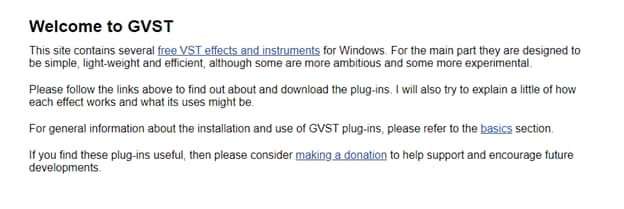
Step 2
The downloads section can be found at the top of the page. When you click it, you will be taken to the Downloads page.
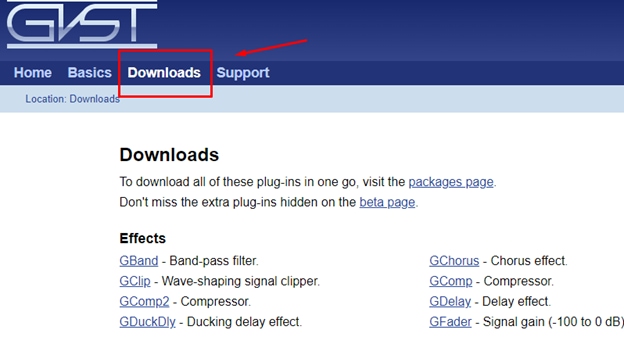
Step 3
Find GSnap from the list of downloads and click on it. A new page will open to find a GSnap download link. Once you click on it, a zip file will be downloaded to your pc. Keep in mind that this download will only work for windows. For mac and Linux, there will be a separate download link.
Step 4
Open the downloaded zip file and extract all files in it.
Step 5
There will be two files present in the folder once you have extracted them. Copy the .dll file to the Audacity plugin directory. Find the Audacity folder in the Program Files folder on your computer. Paste your copied file into the plugins subfolder. Your plugins will be added.
If you are using macOS, then open the Applications folder, right-click audacity’s icon, and choose “Show Package Contents.” Next, open the folders “Contents” and “Extensions.”
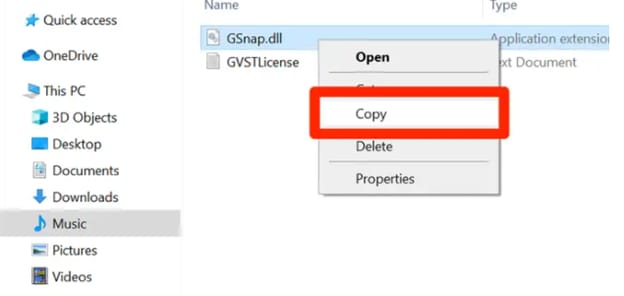
Step 6
In some cases, you may be asked for the administrator’s permission. All you need to do is click on the “Continue Anyway” button if a dialogue box appears and wait for any undergoing process to complete.
Step 7
Now run the audacity program, and if it is already running, you may need to restart it to recognize the autotune audacity plugin.
Step 8
Try recording a new sound in audacity, or you can also open an existing one from your system.
Step 9
Choose the Add / Remove plugins option from the Effects menu in the menu bar. You can enable GSnap by scrolling down and clicking on Enable. Click OK to continue.
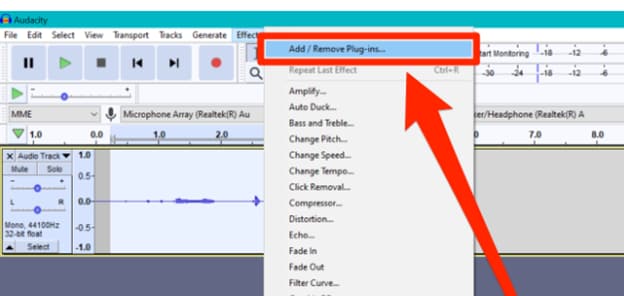
Step 10
GSnap will appear as an effective option under the “Effect” tab in audacity with the new update. Clicking on it will open a window that allows you to tune your audio file automatically.
GSnap has several options and knobs that can be used individually to autotune audio files. Get more information on GSnap’s online manual or by experimenting with the options.
Final Verdict
There is no doubt that autotune feature is a necessity of sound producers these days. Although it isn’t present in audacity, which is the most widely used tool for audio editing but using GSnap, you can get auto tune for audacity now. It is free to download, and in this article, we showed you how you could easily add it to audacity in just a few simple steps.
For Win 7 or later (64-bit)
For macOS 10.12 or later
Step 2
The downloads section can be found at the top of the page. When you click it, you will be taken to the Downloads page.

Step 3
Find GSnap from the list of downloads and click on it. A new page will open to find a GSnap download link. Once you click on it, a zip file will be downloaded to your pc. Keep in mind that this download will only work for windows. For mac and Linux, there will be a separate download link.
Step 4
Open the downloaded zip file and extract all files in it.
Step 5
There will be two files present in the folder once you have extracted them. Copy the .dll file to the Audacity plugin directory. Find the Audacity folder in the Program Files folder on your computer. Paste your copied file into the plugins subfolder. Your plugins will be added.
If you are using macOS, then open the Applications folder, right-click audacity’s icon, and choose “Show Package Contents.” Next, open the folders “Contents” and “Extensions.”

Step 6
In some cases, you may be asked for the administrator’s permission. All you need to do is click on the “Continue Anyway” button if a dialogue box appears and wait for any undergoing process to complete.
Step 7
Now run the audacity program, and if it is already running, you may need to restart it to recognize the autotune audacity plugin.
Step 8
Try recording a new sound in audacity, or you can also open an existing one from your system.
Step 9
Choose the Add / Remove plugins option from the Effects menu in the menu bar. You can enable GSnap by scrolling down and clicking on Enable. Click OK to continue.

Step 10
GSnap will appear as an effective option under the “Effect” tab in audacity with the new update. Clicking on it will open a window that allows you to tune your audio file automatically.
GSnap has several options and knobs that can be used individually to autotune audio files. Get more information on GSnap’s online manual or by experimenting with the options.
Final Verdict
There is no doubt that autotune feature is a necessity of sound producers these days. Although it isn’t present in audacity, which is the most widely used tool for audio editing but using GSnap, you can get auto tune for audacity now. It is free to download, and in this article, we showed you how you could easily add it to audacity in just a few simple steps.
For Win 7 or later (64-bit)
For macOS 10.12 or later
Step 2
The downloads section can be found at the top of the page. When you click it, you will be taken to the Downloads page.

Step 3
Find GSnap from the list of downloads and click on it. A new page will open to find a GSnap download link. Once you click on it, a zip file will be downloaded to your pc. Keep in mind that this download will only work for windows. For mac and Linux, there will be a separate download link.
Step 4
Open the downloaded zip file and extract all files in it.
Step 5
There will be two files present in the folder once you have extracted them. Copy the .dll file to the Audacity plugin directory. Find the Audacity folder in the Program Files folder on your computer. Paste your copied file into the plugins subfolder. Your plugins will be added.
If you are using macOS, then open the Applications folder, right-click audacity’s icon, and choose “Show Package Contents.” Next, open the folders “Contents” and “Extensions.”

Step 6
In some cases, you may be asked for the administrator’s permission. All you need to do is click on the “Continue Anyway” button if a dialogue box appears and wait for any undergoing process to complete.
Step 7
Now run the audacity program, and if it is already running, you may need to restart it to recognize the autotune audacity plugin.
Step 8
Try recording a new sound in audacity, or you can also open an existing one from your system.
Step 9
Choose the Add / Remove plugins option from the Effects menu in the menu bar. You can enable GSnap by scrolling down and clicking on Enable. Click OK to continue.

Step 10
GSnap will appear as an effective option under the “Effect” tab in audacity with the new update. Clicking on it will open a window that allows you to tune your audio file automatically.
GSnap has several options and knobs that can be used individually to autotune audio files. Get more information on GSnap’s online manual or by experimenting with the options.
Final Verdict
There is no doubt that autotune feature is a necessity of sound producers these days. Although it isn’t present in audacity, which is the most widely used tool for audio editing but using GSnap, you can get auto tune for audacity now. It is free to download, and in this article, we showed you how you could easily add it to audacity in just a few simple steps.
For Win 7 or later (64-bit)
For macOS 10.12 or later
Step 2
The downloads section can be found at the top of the page. When you click it, you will be taken to the Downloads page.

Step 3
Find GSnap from the list of downloads and click on it. A new page will open to find a GSnap download link. Once you click on it, a zip file will be downloaded to your pc. Keep in mind that this download will only work for windows. For mac and Linux, there will be a separate download link.
Step 4
Open the downloaded zip file and extract all files in it.
Step 5
There will be two files present in the folder once you have extracted them. Copy the .dll file to the Audacity plugin directory. Find the Audacity folder in the Program Files folder on your computer. Paste your copied file into the plugins subfolder. Your plugins will be added.
If you are using macOS, then open the Applications folder, right-click audacity’s icon, and choose “Show Package Contents.” Next, open the folders “Contents” and “Extensions.”

Step 6
In some cases, you may be asked for the administrator’s permission. All you need to do is click on the “Continue Anyway” button if a dialogue box appears and wait for any undergoing process to complete.
Step 7
Now run the audacity program, and if it is already running, you may need to restart it to recognize the autotune audacity plugin.
Step 8
Try recording a new sound in audacity, or you can also open an existing one from your system.
Step 9
Choose the Add / Remove plugins option from the Effects menu in the menu bar. You can enable GSnap by scrolling down and clicking on Enable. Click OK to continue.

Step 10
GSnap will appear as an effective option under the “Effect” tab in audacity with the new update. Clicking on it will open a window that allows you to tune your audio file automatically.
GSnap has several options and knobs that can be used individually to autotune audio files. Get more information on GSnap’s online manual or by experimenting with the options.
Final Verdict
There is no doubt that autotune feature is a necessity of sound producers these days. Although it isn’t present in audacity, which is the most widely used tool for audio editing but using GSnap, you can get auto tune for audacity now. It is free to download, and in this article, we showed you how you could easily add it to audacity in just a few simple steps.
For Win 7 or later (64-bit)
For macOS 10.12 or later
Also read:
- [New] 2024 Approved Advanced Strategies for YouTube Video Capture
- [New] Inside Look WhatsApp's Vocal Messaging Network
- [Updated] Perfect Online Shopping Picks for One-of-a-Kind Box Packaging
- 2024 Approved Gaming Voice Alteration Techniques Selecting the Optimal Solution
- Correcting Operation Failure X709 on PC
- Fast Und Einfach MP4 Cutter Für Windows 11 – Keine Neukodierung Erforderlich
- In 2024, The Ultimate Step-by-Step on Incorporating Sound Into Videos Using Magix
- New 2024 Approved Top 10 Windows & Mac Compatible Music Arrangement Tools
- Top 10 Password Cracking Tools For Vivo Y36i
- Updated 2024 Approved Discovering the Top 6 Innovative Tools for Live Voice Modification
- Updated Removing Background Music and Sounds From New AVI Files
- Title: New 2024 Approved MP3 Optimization 101 Top Editing Practices for Sound Quality
- Author: Ella
- Created at : 2025-02-27 03:58:48
- Updated at : 2025-03-03 16:12:13
- Link: https://sound-optimizing.techidaily.com/new-2024-approved-mp3-optimization-101-top-editing-practices-for-sound-quality/
- License: This work is licensed under CC BY-NC-SA 4.0.